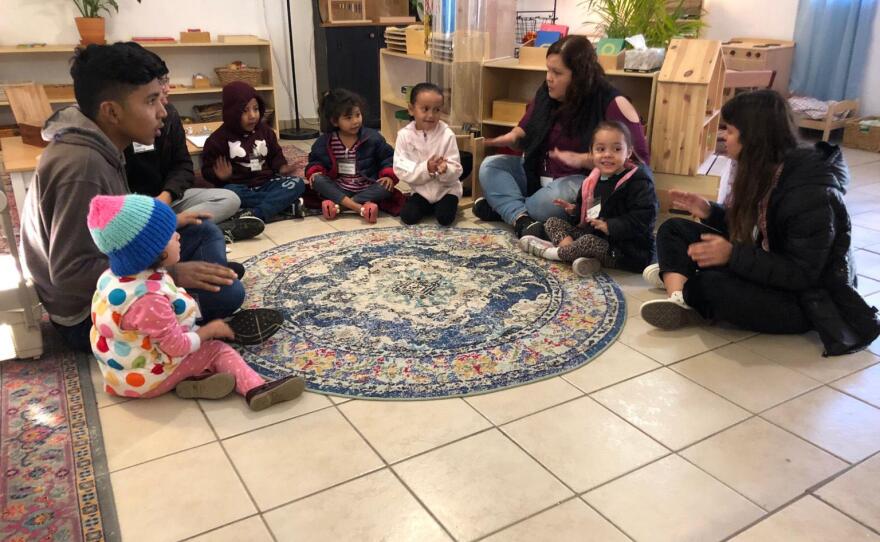Every day at 8:30 a.m. the doors open at a space called “The Nest” where kids from the ages of 0-6 are able to play, paint, and build.
There's a set of tubes the kids can build into fantastic shapes and send marbles tumbling through them. There are light boards they can decorate with translucent shapes, and clay they can pound into any form they choose.
Each day begins with a song. Then, the children go off to different stations, supervised by volunteers.
As with hundreds of other migrant children in Tijuana, they’re trying to make it to the United States to claim asylum with their parents.
The families are fleeing violence and corruption in Mexico, Central America, the Caribbean, and elsewhere, during a time when the United States is closing the door on asylum-seekers.
Some have been sent back to wait in Mexico under the “Remain in Mexico” program, while others are waiting to be admitted to the U.S. to claim asylum after waiting on an unofficial list for months.
Either way, the children are in limbo for months, while their parents struggle to find stability in a city that has seen spiking levels of violence directed towards migrants.
The Nest helps give them a routine, some smiling faces, and a place to be kids, says Alise Ivey, who founded the space.
“The idea is to create a space where children who have been displaced and dragged across border and separated from grandparents, back home, can have a place where they can just be. Where they can heal,” Ivey told KPBS.
The Nest in Tijuana, which opened in September, is one of four other spaces for refugees that Ivey has helped open with the Pedagogical Institute of Los Angeles, a non-profit that focuses on early childhood education. There are two in Greece and one in the Democratic Republic of the Congo.

The Nest sits across from the Caritas shelter, which is where the children live for anywhere between 2-5 months as they wait to claim asylum.
Families share a bed in the overcrowded shelter, which receives no support from the Mexican government. The courtyard is filled with drying clothes and children are left to entertain themselves in a small and chaotic yard. Parents there say the Nest gives their children the opportunity to play in a safe space and gives them time to themselves.
RELATED: New Asylum Rule Leaves Migrants In Tijuana Confused And Desperate
Susana Avalos Torres, 18, is from Michoacán, a state on Mexico's west coast near Mexico City. She fled last year with her two children after her husband disappeared and she received violent threats. Her three-year-old daughter Daniela attends the Nest, which she describes as beautiful.
Not only does it help her daughter, Susana said, but it gives her time to help around the shelter.
“For example, I can help around the communal kitchen, or just help clean up the space,” she said in Spanish.
The center isn’t only helping occupy the youngest migrants.
Seventeen-year-old Ana Mederos Chipres is also from Michoacán. She fled political violence with her parents and her two siblings. She’s been volunteering at the Nest for three weeks, helping the younger children play and learn.
“It helps me relax, just getting to laugh with the kids during the day,” Chipres told KPBS in Spanish.
She plans on becoming a teacher when she gets to the United States.
Right now, the Nest across from the Caritas shelter serves around thirty children a day.
This month, its organizers plan on opening a second location in Tijuana, in a Canyon that houses the Embajadores de Jesus shelter, which is one of the most isolated shelters in the city.
It houses mostly Central American migrants who have been returned to Mexico through the "Remain in Mexico" program. It’s also near “Little Haiti,” where dozens of Haitians have settled while they decide whether to enter the U.S.
“There are so many children living in these shelters and they’re stuck on mattresses all day long," Ivey said. "There’s nothing for them and we know this is a time of enormous brain development.”
Ivey led KPBS on a tour of the new space, which aims to serve 50 children a day.
The conditions in the canyon are extreme — open sewage and burning trash share space with roosters and farm animals just a mile from the US border.
Still, the goal remains to create a space for children to have space to dream. Ivey is still fundraising to operate the space and is holding an open house on Saturday for volunteers north of the border who want to get involved.
For Chipres, it’s all about making sure the children continue to grow, even if they have no home.
“We show them how to keep growing and creating,” she said.







